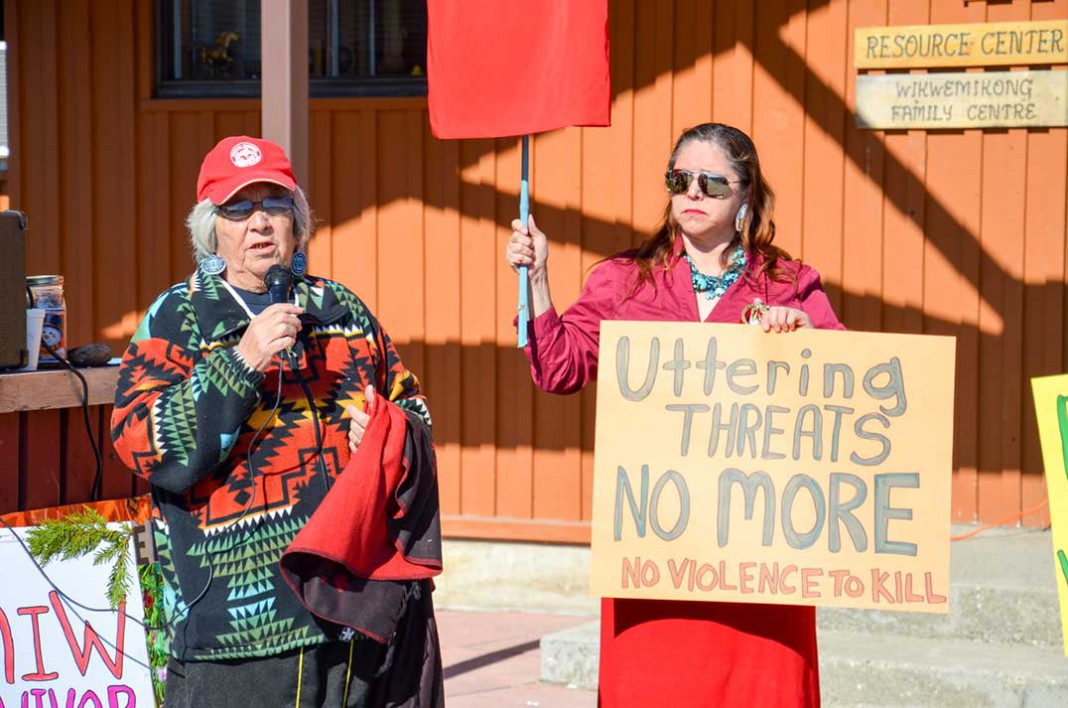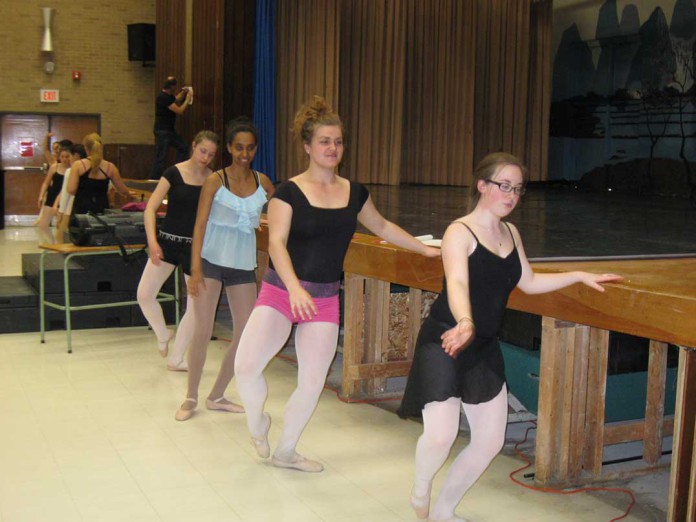WIKWEMIKONG—A large gathering of community members assembled outside of the courtroom in Wikwemikong to show their support for a young female community member who was sexually assaulted earlier this month. The rally was called at her request by the Wikwemikong Grandmothers to bring awareness of the violence that they say is rampant in the community.
“If you know that something is going on and you stand by you are a part of the problem,” said rally emcee Gordie Odjig, who noted that there is a growing sense of unease within the community that violence and the abuse of drugs and alcohol are getting worse. “A proper life is one without violence, without animosity.”
Mr. Odjig pointed out that many of the challenges facing the community today can be traced back to the impact of the residential school system and the disconnect that it created within the base unit of the community: the family. “Most of this comes from colonization, it began 500 years ago,” he said.
Mr. Odjig referenced the lack of economic opportunities that exist in the community, placing much of the blame on centuries of government policies that discriminated against aboriginal entrepreneurs and businesses and created an almost insurmountable systemic bias against their success.
“Without jobs, without anything to do, people are bored,” he said. “With no jobs to get up and go to, they turn to alcohol and drugs. There is a lack of hope. What we are doing here today is because of the damage being done in our communities due to drugs and alcohol, their frustration ends up in violence.”
Mr. Odjig noted that the triggering incident for the rally came about when a young (18-year-old) woman was sexually assaulted in the community. Her alleged attacker was in court that day.
He pointed out that many of his personal friends have succumbed to the lure of drugs and alcohol and that they have wound up in jail for actions they would never consider were they not under the influence of drugs and/or alcohol at the time. “They would not be involved in that sort of thing if they had not been under the influence of drugs and alcohol,” he said. “They are good people, but they have done a bad thing.”
While he was addressing the assembled community members, Mr. Odjig relayed a message he received from a local elder and community member. “They said the present community leadership is too busy in politics,” he relayed. “There have been too many community events cancelled that used to bring us together, things like the maple syrup festival and the whitefish festival, now all we have left are the cultural festival and the traditional powwow. The elder told me to remind the leadership that these things used to bring us together as a community, they created unity.”
While the rally was taking place at 9 am on Tuesday, April 19, the event really began earlier in the day at a sunrise ceremony and a pipe ceremony, noted Grandmother Donna Pangowish, who along with Grandmothers Alison Recollet-Simon and Roberta Oskabewisens, who are also members of PACT Ottawa (People Against the Crime of Trafficking in Humans), were the organizers of the rally. “We are here to support a young lady who has suffered substantial traumatic violence who has asked for our support,” she said. “We chose today because the (alleged) perpetrator is in court today. That is the reason the grandmothers chose to do it today.”

photo by Michael Erskine
A number of speakers addressed the assembly, including Gail Shawande of South Bay, who is observing the fifth anniversary of the murder of her son. She noted that the young man who is now in prison for that crime is himself a victim of a social system that dehumanizes the youth of the community. “I am considering going to sit with him and talk to him,” she said. “That is where I am in my journey.” She recalled that she had been in a deep depression for six months following the death of her son. “I saw where I was going,” she said. “I had two other children. I still have my triggers, I still have my moments. Trauma is not good for ourselves.”
Chief Duke Peltier, who joined the Wikwemikong Drum Group in the singing of the AIM Song (the unofficial American Indian Movement anthem), spoke for a while in Anishinabemowin, thanking the grandmothers for their efforts in both languages before speaking of his own journey. “We are resilient people,” he said. “We will continue to be resilient and take back responsibility for our own affairs.”
Elder Paul Williams spoke in the language as well, addressing the rally on the damage caused by the colonial system.
Mark Eshkawkogan described his own challenges, noting that he was now four years free of substance abuse and relating his long journey to survival.
Following the speeches, the assembled gathering fell in behind the grandmothers to march in solidarity to the Wikwemikong Arena and back to the band offices and the courthouse before a small feast of pizza.
During the rally a small police and security presence kept a discrete distance, listening to the speakers at the peaceful rally.




